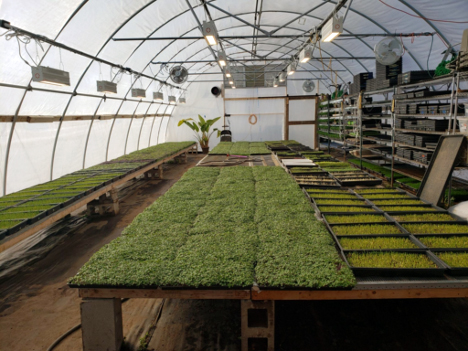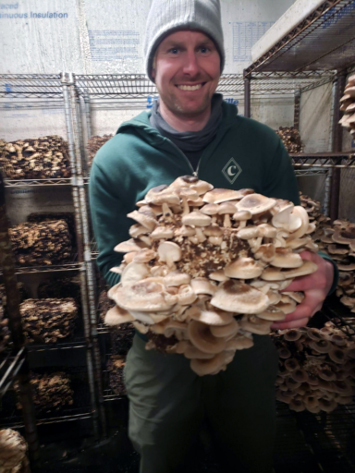 It’s April. The weather’s getting warmer, the ground has thawed, and it’s easy to imagine that local veggies will now appear in abundance on our shelves. Unfortunately, that’s just not the case—in fact, April is usually the absolute low point for local produce availability. Last year’s storage crops are done and gone, and though it’s a great month for planting, the vast majority of seeds planted in April will not come to harvest until May or later.
It’s April. The weather’s getting warmer, the ground has thawed, and it’s easy to imagine that local veggies will now appear in abundance on our shelves. Unfortunately, that’s just not the case—in fact, April is usually the absolute low point for local produce availability. Last year’s storage crops are done and gone, and though it’s a great month for planting, the vast majority of seeds planted in April will not come to harvest until May or later.
So how do you satisfy your craving for fresh, locally grown produce this month? We recommend a regular dose of organic microgreens and mushrooms from Vitruvian Farms in McFarland. The best thing about Vitruvian’s produce (besides how delicious and nutritious it is, of course), is that it’s not just available this month, or during the regular growing season—these are some of the few local produce items we carry that are in steady supply all year round!
Twelve years ago, Tommy Stauffer and Shawn Kuhn were UW college roommates with a big idea — to start a local, organic vegetable farm that not only provides fresh, nutritious, organic food to the community, but also works in balance and harmony with its natural surroundings, and sets a new standard for what local farming and farm work can look like. They wanted to prove that farming in our community could be a viable career choice, and this meant creating a farm that provides year-round, living wage work to their crew… and that meant pushing the boundaries of seasonality in our Wisconsin climate. This was no small task, but twelve years later, while Tommy and Shawn will tell you that there’s still plenty of work to be done, they’ve come a long way toward making their dream a reality. The bonus for us is that year-round work for the Vitruvian crew means year-round food for all of us Madison area eaters to enjoy!
What They Grow
Vitruvian Farms focuses on three main areas of certified organic production: mushrooms, microgreens, and leafy salad greens. Each has a unique growing environment, designed to complement the others—not just in terms of growing techniques, but also by providing steady income generation for their farm, and reliable, year-round work for their employees.
Organic Microgreens
Microgreens are popular in high-end restaurants, and have developed a reputation for being “fancy.” But there’s nothing inherently fancy about them—they’re simply the very young shoots of common crops such as sunflowers, peas, radish, and kale. They’re easy to confuse with sprouts, but unlike sprouts, microgreens are grown in soil, usually in trays. Vitruvian’s micros are grown in a greenhouse (heated in winter), using mostly natural light supplemented with some artificial lighting. They specialize in greens such as pea shoots, sunflower shoots, and their amazing petite salad mix, all of which take microgreens beyond a fancy restaurant garnish to a hearty (and nutrient dense) green vegetable in its own right.
 Mushrooms
Mushrooms
Mushrooms are one of the fastest growing categories in our produce departments, and Vitruvian farms are some of the best! Inside an unassuming outbuilding on the farm in McFarland, you’ll find several darkened, humidified rooms filled with blocks of compressed organic sawdust which act as the growing medium for Vitruvian’s beautiful shiitake, oyster, and lion’s mane mushrooms. Tommy and Shawn are entirely self-taught mushroom farmers, and they have grown this side of their business dramatically in the last few years. They now produce an incredible 500 pounds of fresh organic mushrooms per week, all year round!
Organic Leafy Salad Greens
What happens to those blocks of organic sawdust after the mushrooms have been harvested? They’re moved outside and used to fertilize Vitruvian’s outdoor greens fields and high tunnels! During the traditional growing season, Vitruvian’s product lineup expands to include organic salad mixes, arugula, and baby spinach. If all goes well, we’ll start to see some of these greens from their farm’s six high tunnels (unheated greenhouses) later this month. Field-grown greens will likely be available in May.
Plans for the Future
Over the past twelve years, Tommy and Shawn have built an incredibly unique farm, but they aren’t done yet! Right now, Vitruvian Farms sells their produce directly to consumers via a CSA and an online storefront; and also wholesales to area restaurants and grocery stores (like your Co-op!). In the next few years they hope to expand this to include a brick and mortar storefront. This store would serve as an incubator and outlet for small, local farms and food businesses, with the aim of continuing to foster growth and opportunity in our local food system as a whole.
More sustainable packaging is another item on Vitruvian’s to-do list. Almost everything they grow is delicate enough that it must be packaged for retail sales—and finding a non-plastic packaging solution that is economical, ecological, and also keeps the product fresh is an almost impossible task. If anyone can do it, it’s the creative, inspired owners of Vitruvian Farms!









